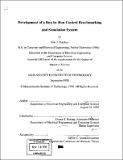Development of a run by run control benchmarking and simulation system
Author(s)
Stuckey, Eric J. (Eric James), 1974-
DownloadFull printable version (4.270Mb)
Advisor
Duane S. Boning.
Terms of use
Metadata
Show full item recordAbstract
As the semiconductor industry begins to move toward the introduction of fault detection and classification as well as run by run (RbR) process control methodologies, the identification of application scenarios and the means to compare and benchmark available solutions is an essential step. That step has been taken for FDC, and its importance for RbR has been recognized. The work presented here examines the feasibility of such an activity for run by run control including the determination of appropriate scenarios for run by run control, and determining how meaningful comparisons or benchmarking between controllers can be accomplished. There have been a number of benefits as a result of this project. First, we have shown that the benchmarking of run by run controllers is indeed feasible, and through the development of a run by run control simulation and benchmarking framework, and the determination of a set of process scenarios, SEMATECH is well-prepared for future efforts that might undertake benchmarking and/or demonstration of available commercial and experimental run by run controllers in specific realistic scenarios. Second, we now have a better understanding of the demands on and capabilities of run by run control, as well as a better understanding of the requirements of a successful benchmarking system. This information has been obtained through a literature survey and a questionnaire distributed to SEMATECH member companies to solicit feedback on the requirements and opportunities for run by run control and run by run control benchmarking. Third, we have defined and implemented several control scenarios that can serve as benchmarking cases in a future benchmarking effort. And finally, experience has been gained in using messaging protocols to connect RbR controllers to process simulators (or actual process tools) that can be beneficial in defining a standard set of communications for RbR controllers and other process peripherals.
Description
Thesis (S.M.)--Massachusetts Institute of Technology, Dept. of Electrical Engineering and Computer Science, 1998. Includes bibliographical references (p. 68-69).
Date issued
1998Department
Massachusetts Institute of Technology. Department of Electrical Engineering and Computer SciencePublisher
Massachusetts Institute of Technology
Keywords
Electrical Engineering and Computer Science